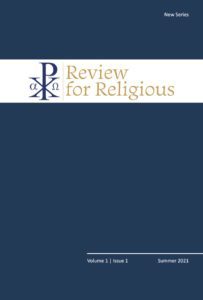We invite you to preview Review for Religious 2, no. 1 (Winter 2022)!
The first issue of 2022 is out! Our first open issue of the year features an excellent slate of articles, many centered around the theme of identity, including:
- a suggestion about a new central image for thinking about religious life
- a framework for a new theology of vocation
- themes from Pope Francis’s teaching for formation in religious life, and more!
You may preview the issue by downloading the table of contents, reading the sample article, or previewing excerpts from all the articles below.
Excerpts From the Winter 2022 Issue
I would argue that befriending and suitably expressing one’s erotic energy is not inimical to a religious’ call to celibate chastity and, in most cases, community life, but, on the contrary, that this task is one of the challenges for the ongoing development of religious life today.
As is becoming more and more apparent to some religious leaders, younger sisters entering religious life are understanding and interpreting obedience in ways that are challenging the previous generations of sisters’ understanding of how it should be lived out. Those generational differences—as this study demonstrates—are so pronounced that they even cut across other powerful forces, such as strong cultural-lingual divides within a country.
While it is fair to say that all popes bring their own distinctive gifts and wisdom to the office they hold and the universal church they serve, Pope Francis’s writings and ecclesial vision offers members of religious communities a particularly welcome perspective on the nature and purpose of religious life in the contemporary church. To that end, I will focus this article on the way in which Pope Francis has thus far contributed to the themes of discernment and vocation during his pontifical ministry with a particular eye toward the ways in which these insights can help inform, shape, and renew religious formation and vocation ministries today.
While many other authors have well attended to the post-Conciliar developments in religious life, my interest is to explore the challenges of 21st century religious life as it moves further from the Council and into the future in dialogue with the evolutionary and cosmological sciences. I intend to do that by introducing a new image for the evolving development of religious life. I suggest that it must “rest on the future” to find its place both within the scientific worldview that dominates our current culture as well as to find its meaning, purposefulness, and goal within the Christian tradition’s trust in a God of promise.
The church might benefit from a new theological framework that leaves behind the problematic features of the “states of life” theology. Such a framework must illuminate the full dimensions of the universal call to holiness to which all of us are called and within which discernment regarding the more specific vocations to marriage or religious life will be undertaken. In this essay we will argue that Christian friendship provides this more comprehensive theological framework, one that can account not only for our primordial baptismal call to holiness but also for the more specific vocations to marriage and religious life.
This article explores how these sisters understand and experience their vocational call to express their love of God through a life orientated towards serving others in active ministry. What meaning they make of a less active life and how that shapes their identity? It presents what I argue to be three emerging forms of ministry, articulated by sisters in several theological expressions, suggesting that the sisters re-shape and develop new theologies of what it means to be apostolic in the midst of physical diminishment and limited social engagement.
